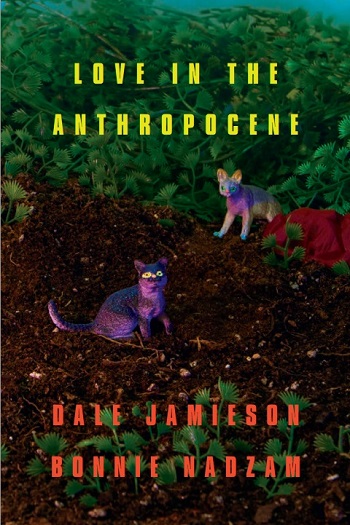Introduction
by John Oakes, co-publisher of OR Books
Welcome to the Anthropocene, the Age of Humanity. It wasn’t so long ago that there were places on the earth that were truly alien to our species. They were existing on their own terms, and had their own logic, following their own algorithms. And then a few thousand years ago, barely a hairline register on the geologic scale, we humans made the transition from savannah-dwelling prey for big cats to . . . something else. We’ve kept expanding and conquering in an evolutionary analogue to Moore’s Law—except in this case the periodic quantum leaps mark environmental impact rather than technological efficiencies.
There’s not a place on the planet you can go that’s not been changed by our hands. Not a breath you can take, not a drop of water you can drink, that’s not been affected by our “industry.” You can be in the deepest Brazilian jungle, the farthest reaches of McMurdo Sound, a Tahitian coral reef and you will detect the human presence. Good or bad: them’s the facts.
Love in the Anthropocene, a new book from two celebrated thinkers—environmental philosopher Dale Jamieson and novelist Bonnie Nadzam—attempts to address this reality, imagining life as it might be fifty years from now. If a forward-thinking perspective marks it as science fiction, that’s not unjust, because there’s also plenty of science (meaning, a relation of the facts as we understand them) in the book. The five stories it encompasses are bracketed by non-fiction meditations on climate change and the nature of love, the one unknowable but essential constant Jamieson and Nadzam discern in their exploration of this territory. To my mind, that provides some measure of comfort—as the earth spins and we travel together through the universe, quite literally but obliviously, as our environment changes around us because of our obstinacy or stupidity or carelessness, that one thing—the love that binds us to each other, and that binds us to our environment—remains unchanged.
About the authors:
Dale Jamieson has held visiting appointments at the National Center for Atmospheric Research in Boulder and the Institute for Advanced Study in Princeton. He is currently Professor of Environmental Studies and Philosophy and Director of the Animal Studies Initiative at New York University. He has published widely in environmental philosophy, animal studies, and ethics: most recently Reason in a Dark Time: Why the Struggle to Stop Climate Change Failed—and What It Means For Our Future (Oxford, 2014). Love in the Anthropocene is his first work of fiction.
Bonnie Nadzam has published fiction and essays in many journals and magazines, including Granta, Harper’s Magazine, Orion Magazine, The Iowa Review, Epoch, The Kenyon Review, and many others. Her first novel, Lamb, was recipient of the Center for Fiction’s first novel award in 2011, and was longlisted for the Baileys Women’s Prize for Fiction. It has been translated into several languages. Her second novel, Lions, will be out from Grove Press in 2016.
The following is an excerpt of “Holiday,” from Love in the Anthropocene by Dale Jamieson and Bonnie Nadzam.
The train pulled into shadow and there they were, on the lower level of the dome. They slowed to a stop and for a moment, everything was quiet and still, the silhouettes of other passengers dark among the blue shadows. The orange interior lights blinked on and the passengers began standing and stretching, chattering as they found their luggage.
Advertisements for New Harmony had been accurate. Bring your hungry, your traumatized, your bored, your restless, your longing to forget. It was as green and vibrant a city as any of them could have imagined. There were lakes, gardens, schools, restaurants, shops, museums, and yes, an ocean complete with a necklace of islands and a pounding surf of beginner-, intermediate- and advanced-sized waves dissolving in a white lace of clean sea foam on golden sands.
In a small hotel overlooking the water, the women each had their own sleeping space and shared a common room. In each sleeping room, a bed, a vanity, and a small cooler. Anya opened hers and squealed. She stood in the doorway to the common room.
“Yuzu tea.” She turned over the glass jar for them to see. “So expensive. I’ve only had this once in my life ever, but I loved it, loved it.” She put her hand over her heart for effect, went back into her room to replace the jar and withdrew a small package of chocolate dipped rice wafers. “Oh my God,” she called out. “My other favorite. I haven’t had these since I was a kid. How am I not going to buy and eat these?”
Clare and Gloria exchanged a smile. “I think it’s always been the other way around,” Clare said, “you eat them, and they charge you.” She went to inspect her own cooler.
“Amazing,” she called back toward the common room. She stood in the doorway and showed Gloria a small glass jar of pickled red grapes. “I can’t remember ever telling anyone I liked these. Or even when I had them last.”
“You must have mentioned it on-grid some- time,” Gloria said. “That’s how it works.”
“What was in your cooler, Gloria?” Anya asked. She shrugged. “I haven’t looked.”
“Gloria’s beyond temptation,” Anya said at Clare and rolled her eyes. She opened the chocolate rice wafers and stretched out across the rug on the floor. “God they really know just how to get you.” She turned a wafer over in her fingers and popped it into her mouth. “I didn’t know they still made them.”
The women swam in the sea and went shopping. More vials for Anya, a water storing jumpsuit for Clare. Gloria was interested in a sort of portable rain cloud she could’ve brought back with her to the camps, but she probably would’ve had to hide it there.
They settled on The Meat Lab for dinner—a famous restaurant high on their list of places to see. Their steaks were perfectly marbled without a trace of gristle or excess fat. Gloria tried to put aside the stories about how such perfect steaks were made, which wasn’t very different from making babies.
“You are such a purist,” Anya said.
“It’s not that,” Gloria said. “I just prefer the real thing.”
Anya furrowed her brows and shook her head in mock confusion. “Is that not exactly what I said? Anyway, steak from cows? Seriously, Gloria?”
“Why do you say it like that?” Gloria shrank back. Anya’s tone had been as harsh as if Gloria had said she killed and ate her own mother. Cow steak wasn’t really that unusual, was it?
“This is totally real,” Clare said. “Enjoy it.” But she’d hardly touched her own food.
“I want a lobster tail tomorrow,” Anya said. “Do they grow those here?”
“Rattlesnake, moose cheeks, bear belly, anything you want,” Clare said. “They have everything.”
“Excellent. Everything’s what I came for.”
“Do you think the people working here live here too?” Gloria asked, noticing that everyone employed there looked like Anya. “Like can they ever get out?”
“Well they couldn’t live out there,” Anya said, pointing at the wall behind her, toward the outdoors. “Anyway, why would they want to leave?”
“Why did they let us in through the basement though? Do you think there’s people outside? Protestors? Like they say?”
“Like who says? Protestors? In the desert?” Anya laughed. “Fat chance.”
“What would they be protesting about?” Clare said. “It’s not labor protestors. Can you imagine an easier job?” The waiters and waitresses were clean and poised and full of quick wit and easy laughter, delivering plates of beautifully designed food to customers with money to pay for them. “I bet they live here. Can you imagine? Living here?”
“Sign me up,” Anya said. “I bet there’s a waiting list twenty years long.”
Gloria made a face. “I’d like to see what’s out there, on the other side of the dome.” She stabbed at her steak.
“Course you would. Gloria the truthseeker.” Anya gave her a flat stare as she sipped her drink. “She wants to look behind the curtain unlike the rest of us fools. You have to forgive us. We can’t all be so wise and good.”
Gloria’s face flushed. “That’s not it at all, Anya. I’d just like to see it. I feel a little out of place here in the dome.”
“Oh you are,” Anya said, chewing. “Everyone else here wants to have fun.” Gloria looked at Clare to defend her, but Clare was pale, sweat beading on her upper lip.
“What’s the matter Clare?” Gloria asked.
“I just.” Clare put her hand on her belly and shook her head. “I don’t feel quite right. I think it was something in those vials.”
Anya leaned toward her. “Are you sick? Don’t be sick!”
Clare shook her head. “I’m sorry. I don’t know what’s wrong with me. I’ll be ok in a second. It comes and goes. It’s already going.” She smiled. Clare and Anya stared at her. “See? Better already.”
Gloria put her hand on Clare’s arm. “Do you need a doctor? Do you need to go back to the hotel?”
Anya pointed her fork at them, one at a time. “No! Stop it, both of you. Your belly hurts because you work too much and too hard. You don’t need a doctor. You need fun. We’re all going straight from dinner to Loverman, Inc.,” she announced. “And nobody’s going to be sick. Now. How does your belly like that, Clare?”
Clare laughed and took a sip of her drink. She took a deep breath and let it all out. “You’re crazy.”
“We are not coming all this way, staying for a week, and not trying it.”
“I’ve heard,” Clare said lowering her voice, “that they’re not really machines.” She wiped her upper lip with her napkin and set it back in her lap. “That the technology is a hoax and they’re actually real men. But people don’t like the idea of actual male prostitutes so they lie and call them robots.”
“Dirty words,” Anya said, running her hands up and down her body. “Makes me like it even better.” “Oh come on. They could never get away with that,” Gloria said.
“But then of course I’ve also heard,” Clare said, leaning in, “that the Lovermen are very, very high tech. They’re continually taking your vitals as they touch you, and recalculating…”
Anya lifted a hand. “Don’t tell me! I don’t want to know.”
“…to maximize your pleasure.”
“Stop!” Anya said, laughing, and she put her hand over Clare’s mouth. “I don’t care how it works as long as it works. And we’re all going. Clare’s job was to organize the trip. My job is to make sure we have fun.”
Main photo: Copyright Oast House Archive and licensed for reuse under this Creative Commons Licence.
















